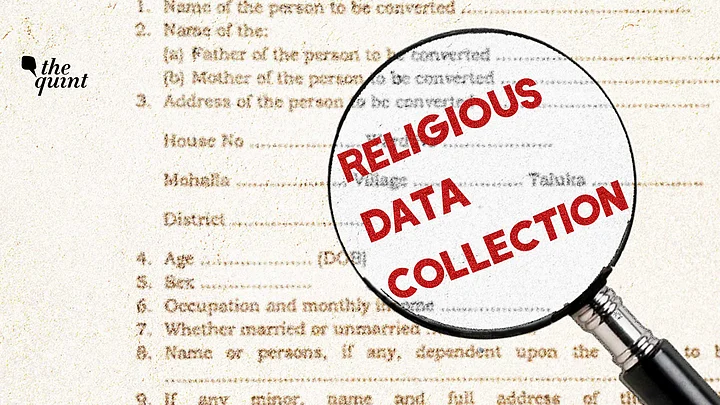From name to monthly income, caste, sex and full address, Karnataka's anti-conversion bill will ensure the collection of personal data of all individuals who undergo religious conversion, whether unlawful or not. The data will then be displayed for public scrutiny, The Quint has learnt by accessing the draft of the bill.
This, even when similar clauses in Himachal Pradesh’s anti-conversion act were struck down in 2012 by the state’s High Court that held, “A person’s belief or religion is something very personal to him.”
The bill was approved by Karnataka government’s cabinet on Monday, 20 December, and is expected to be tabled in the Legislative Assembly on 21 December.
Karnataka's Bharatiya Janata Party government had earlier ordered three controversial church surveys, including an Intelligence collection exercise, to classify churches and Christian preachers and priests. Prominent religious leaders of minority communities, including the archbishop of Bengaluru Peter Machado, have opposed the surveys, calling them unconstitutional.
What Personal Details Will be Collected?
As per the draft bill titled, Karnataka Protection of Right to Freedom of Religion Bill-2021, people who undergo religious conversions will have to fill two forms – one each before and after conversion – and submit the same before the district magistrate. The details sought in the forms include, name, age, sex, caste and address. The names of the parents and anyone dependent on the person undergoing conversion will also have to be specified in the forms.
The bill stipulates that names of minors, who are dependent, will have to listed separately. The name and address of the minors' guardian will also have to be detailed. Meaning, this will be applicable to people who have minor children who are dependent on them.
The bill further asks the applicant to specify their marital status and full address including house and ward numbers, mohalla, village, taluk and district details. The exact location where the “conversion ceremony” is expected to happen or has taken place will also have to be listed out. The form also asks for the date of conversion and the name of the priest who officiated.
The person who facilitates conversion is also expected to submit a similar form detailing out the personal details of those who wish to perform the conversion.
All the forms should be submitted with the accompanying copies of an identity card or an Aadhaar card, the bill stipulates.
Ruling against such intrusive collection of personal information, the Himachal Pradesh High Court’s bench had observed, “We are of the considered view that in case of a person changing his religion and notice being issued to the so called prejudicially affected parties, chances of the convertee being subjected to physical and psychological torture cannot be ruled out.”
However, the Karnataka bill says that the information submitted by the person undergoing religious conversion can come under scrutiny of the public, welfare departments and the police.
How Will the Information be Scrutinised?
As per the bill, the information will first be displayed on the notice boards of the district magistrate and revenue officials including the tehsildar. This means that, anyone will be able to raise an objection to the conversion, as the notice is kept on public display.
Moreover, the bill makes it mandatory for district revenue and social welfare, backward classes welfare, and minorities welfare departments to investigate the “genuine intention, purpose and cause,” of the conversion.
If the authorities conclude that the conversion is unlawful under the provisions of the anti-conversion act, the case can then be referred to the police.
The bill is also harsh to people who have ‘lawfully’ converted as it allows the district magistrate to issue an “official notification” to “concerned authorities” about the religious conversion. That is, employer, principals and heads of educational institutions, and officials of revenue and welfare departments will be informed of the religious conversion through a notice.
The bill does not allow individuals to opt out of submitting the details as it has criminalised any refusal to provide personal information about conversions.
The bill stipulates that refusal or omission to submit the forms can lead to one to five years of imprisonment and fine.
Against this background, the observation of the Himachal Pradesh High Court which said that issuance of such a notice could lead to “communal clashes”, should be noted. The court observed, “In fact, this may open a Pandora's box and once notice is issued, this may lead to conflicts between rival religious outfits and groups.”
Christian Groups to Challenge the Bill?
Meanwhile, several churches in Karnataka have indicated that they may challenge the bill if it is passed in the Karnataka Assembly. Speaking to The Quint, a senior Christian religious leader said, “We condemn the bill and will be challenging it in court, if it becomes an act.”
In Himachal Pradesh, it was the Evangelical Fellowship of India which had challenged the anti-conversion law and the clauses that allowed data collection.
Meanwhile, the Indian National Congress, which is in Opposition in Karnataka, is expected to oppose the bill when it is tabled in the Assembly. Speaking to The Quint Congress MLA Priyank Kharge said that the party will oppose the bill as it, "violates Article 25 of the Indian constitution that ensures the right to practice and propagate one's own religion."
The bill can be used to target minorities in the state, Kharge said.
(With inputs from Vakasha Sachdev)
(At The Quint, we question everything. Play an active role in shaping our journalism by becoming a member today.)
